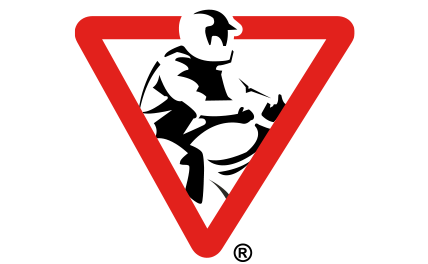IRVINE, Calif., May 26, 2020 – Motorcycle safety starts with research. It’s the cornerstone of the MSF’s Rider Education Training System. And encouraging new motorcyclists to start out with formal rider training, and experienced motorcyclists to take refresher courses, is a big part of Motorcycle Safety Awareness Month. MSF coaches Andria Yu and Ty van Hooydonk conducted a phone interview with Dr. Ray Ochs, MSF vice president of training systems, to learn more about what’s at the heart of every MSF RiderCourse.
Why does research matter so much to the MSF?
“Bottom line: It helps to ensure positive rider outcomes as a repeatable process. Since we’re always searching for better ways to reach students with safety education and training messages, we will ‘re-search’ using several methods that include professional literature reviews, academic papers and textbooks, pilot and field testing, surveys, and, of course, full-blown research projects like the MSF 100 Motorcyclists Naturalistic Study. Research helps us transcend beyond personal opinion or whim and provide scientific results.
“A basic function of research is to help with decision points, and this includes answering key questions about focal points and direction. In program development, this means to start with a mission and vision, determine strategies to get there with clear objectives in mind and constraints to consider, and move forward with action steps until satisfied with results.
“Many people view research as proving something works, and while much experimental research that uses a control group and independent variable to discover treatment effects does that, a key focus is not necessarily to prove but to improve. This is especially true when dealing with the human element, as there is typically no one fix for a problem – that is, no inoculation provides an end-all answer. It takes action research.
“It is important to point out that there is a lot of pseudo-research that’s published from time to time. This is sometimes called junk science as claims are dressed up in the form of serious science but lacking adequate empirical and conceptual qualities. Assessing good research, like that done per MSF, includes looking at the qualifications, credentials, and motivation of the principals, seeing if there is hyperbole in the reported results, looking for falsification and misrepresentation, and getting evidence of quality from experts who are familiar with sound research methods.”
With some concrete examples, where do we see research results in the MSF Basic RiderCourse actually reflected in the way an MSF RiderCoach conducts a range session?
“I suppose a good starting point is identification of the problem, which in our case is to look at crash studies, research, to find out the cause of motorcyclist crashes. There is not an easy answer, and as you know, a smart way to consider the human element is to start with a baseline that crashes are caused by an interaction of factors. A primary source is the National Safety Council’s Accident Facts, which is published annually. Another good source is the National Highway Traffic Safety Administration.
“Of course, we look at studies from all over the world. For example, the biennial Institute for Motorcycle Safety conference in Germany is co-sponsored by the MSF and we routinely provide papers and chair sessions. A specific example of how research related to pilot and field testing is used would be to look at motorcycle steering. A key question would be: How can a novice best learn the physical action of counter-steering?
“Further related questions: What is the optimum path of travel to use? How much time-on-task is needed? What is the minimum amount of information, knowledge, and skill a novice needs to acquire? What speed is needed to produce the desired effect? To address these and other variables, we try out various words for developing knowledge and various paths of travel and procedures for the range, first via pilot testing where we use staff and experienced riders, then field testing where we work with novices. I suppose we tested a half dozen or so exercise configurations before landing on one that produced the best results.
“After the exercise is solid enough to pilot test, we then look specifically at how it can be instructed and coached. There are a lot of elements to consider. For example, what statements should be put on the range cards? What are the best coaching positions? What is the best way to move from stage to exercise start points? How will exercise transitions be handled? How will riders get back to the staging area? What are the minimum results expected? What are the best questions to cause reflection and transfer to the real world?
“With these and other questions in mind, we then field-test the materials to determine the best course of action in producing the best results and best RiderCoach materials. Then it’s time to move on to the best methods to teach RiderCoach candidates how to put all this together. Now multiply this by each exercise and then consider how this needs to become a cohesive whole – the course and certification process – and now add the classroom components, and you get an idea of how complex program development can be.”
Just how does the MSF go about conducting research? How does a research project start and what are some of the major steps involved?
“The classic scientific method is used as a start point. This method has the steps of: One, what’s the question or purpose?; Two, what background information and research can be used to provide clear perspectives about the question or purpose?; Three, determine a strong hypothesis, or best educated guess about possible answers and/or effects; Four, design a way to test the hypothesis considering the variables; Five, record and analyze the results of testing to support or refute the hypothesis; Six, conclude whether to accept or reject the hypothesis. Using the example of counter-steering, each trial or iteration of the attempts is a mini research study that leads to the next question or purpose.
“A major part of MSF research in program development is in the area of literature reviews. Since we are involved in the key areas of safety, learning, and motor skill development, we need to know the research related to these areas and what the results are from studies and from expert analysis regarding theories and applications that connect to rider education and training. These are the underpinnings that form the questions and decision points to move forward.
“Early on in rider education and training, we were fortunate to have a plethora of literature from the driver and traffic safety education community to use as a start point. There are major similarities and a key task is to discover the fundamentals of how they got where they were and figure out the distinctions per the motorcycle task. That is why one of the seminal documents for us is the Motorcycle Task Analysis published in 1974. Of note is that this document and several other research projects were reviewed by the MSF Rider Education and Training System Development and Oversight Team – RETSDOT – in developing our current programming. Much of this information is available in our online library.”
MSF RiderCourses are revised from time to time. Has a new research project ever changed a RiderCourse in the way it was updated?
“Research into improving rider outcomes never stops. We are always on the lookout for innovations and best practices and, of course, as we implement programs we are alert to feedback to help the next round of improvements. That is why it is so important for us to communicate with stakeholders, especially RiderCoaches, so we can continuously gauge how to constantly improve. We believe in lifelong learning not just for riders and ourselves individually, but for the MSF as an organization.
“Whenever there is a structural change, like we had with our learn-to-ride course in 2001 when we moved from the MRC:RSS (Motorcycle RiderCourse: Riding and Street Skills) to the BRC, and when we moved in 2014 from what we now refer to as the BRC 2013 to the current BRC, we not only took information learned from the past, updated literature reviews and program development principles, we conducted extensive pilot and field tests to ensure any changes were based on a solid foundation of improvement, including field test results. Once initiated, testing continues until key questions are answered and few if any changes or development aspects are needed.”
There’s real-world research, such as the MSF 100 Motorcyclists Naturalistic Study, and there are MSF field studies. What’s the difference?
“The MSF 100 Motorcyclists Naturalistic Study was a major multimillion dollar study as a collaboration between the MSF and the Virginia Technical Transportation Institute. VTTI had gained an international reputation with its work related to naturalistic studies for car drivers, and there was value added for the highway safety community, opportunities to find out what riders naturally do when they ride that would be valuable for the motorcycle safety community.
“MSF field studies are related to testing courses and other learning programs associated mostly with curriculum development. From the BRC and the ARC (Advanced RiderCourse) to the IME (Introductory Motorcycle Experience) and the SMARTrainer, trials are conducted to ensure the materials and methods are complete and ready for mass distribution. Major research like the MSF 100 occurs infrequently, while MSF field studies are ongoing when new courses are being developed or current courses revised.”
What’s the status of the MSF 100 Motorcyclists Naturalistic Study?
“Data collection began in 2011 and ended in 2013. Now it is a matter of mining the data to categorize the over 360,000 miles of riding and a multitude of experiences from 100 riders who had their motorcycles instrumented with five cameras. MSF interest is primarily in the human element factors. There is probably a few decades’ worth of data to be mined, and acquisition of the data is dependent on the research community to find answers for their questions. Our board has expressed an interest in working with qualified partners to further the utility of our data.”
Will we see the MSF 100 reflected in future RiderCourses?
“First of all, it already is. Topics related to the study’s findings are addressed in the BRC and other MSF courses, and the study confirmed we are providing proper information. Examples include information related to intersections, following distance, cornering, and peer pressure.
“Because of the nature of a naturalistic study, that doesn’t wait for a crash to happen and then perform post-crash analysis, some near-crash scenarios and low-speed crashes that wouldn’t be officially reported were observed. As new data is discovered or as researchers find information that would improve our RiderCourses, we will be certain to include this.”
How is research funded at the MSF?
“Proposals for major research projects, such as the MSF 100, are evaluated by our board of trustees. Funding for such projects is not a normal part of MSF budgeting. As far as pilot and field testing related to curriculum development and our Rider Education and Training System, that is a typical line item in our annual budgets, and it changes from year to year depending on priorities and program objectives.”
The Motorcycle Safety Foundation promotes safety through rider training and education, operator licensing tests, and public information programs. The MSF works with the federal government, state agencies, the military, and others to offer training for all skill levels so riders can enjoy a lifetime of safe, responsible motorcycling. Standards established by the MSF have been recognized worldwide since 1973.
The MSF is a not-for-profit organization endorsed by American Honda Motor Co., Inc.; BMW Motorrad USA; BRP, Inc.; Harley-Davidson Motor Company, Inc.; Indian Motorcycle; Kawasaki Motors Corp., U.S.A.; KTM North America, Inc.; Suzuki Motor of America, Inc.; Triumph Motorcycles America; and Yamaha Motor Corporation, U.S.A. For safety information or to enroll in an MSF Basic RiderCourse near you, or to learn more about the many other MSF course offerings, visit MSF-USA.org or call (800) 446-9227. Follow @msf__usa to keep up with the MSF on Twitter and Instagram.


